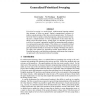Free Online Productivity Tools
i2Speak
i2Symbol
i2OCR
iTex2Img
iWeb2Print
iWeb2Shot
i2Type
iPdf2Split
iPdf2Merge
i2Bopomofo
i2Arabic
i2Style
i2Image
i2PDF
iLatex2Rtf
Sci2ools
108
click to vote
NIPS
1997
1997
Generalized Prioritized Sweeping
Prioritized sweeping is a model-based reinforcement learning method that attempts to focus an agent’s limited computational resources to achieve a good estimate of the value of environment states. To choose effectively where to spend a costly planning step, classic prioritized sweeping uses a simple heuristic to focus computation on the states that are likely to have the largest errors. In this paper, we introduce generalized prioritized sweeping, a principled method for generating such estimates in a representation-specific manner. This allows us to extend prioritized sweeping beyond an explicit, state-based representation to deal with compact representations that are necessary for dealing with large state spaces. We apply this method for generalized model approximators (such as Bayesian networks), and describe preliminary experiments that compare our approach with classical prioritized sweeping.
Classical Prioritized Sweeping | NIPS 1997 | NIPS 2007 | Prioritized Sweeping | Prioritized Sweeping Uses |
Related Content
| Added | 01 Nov 2010 |
| Updated | 01 Nov 2010 |
| Type | Conference |
| Year | 1997 |
| Where | NIPS |
| Authors | David Andre, Nir Friedman, Ronald Parr |
Comments (0)

